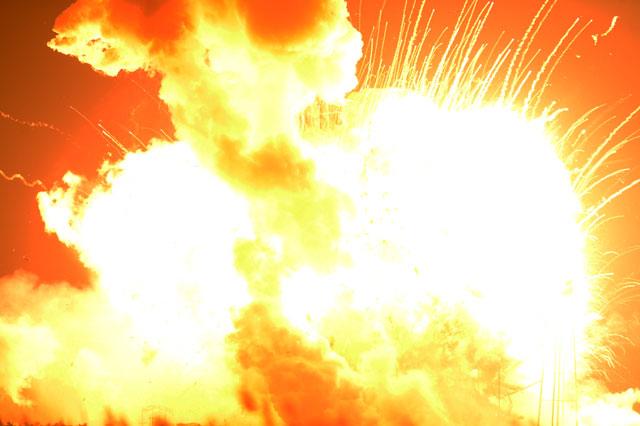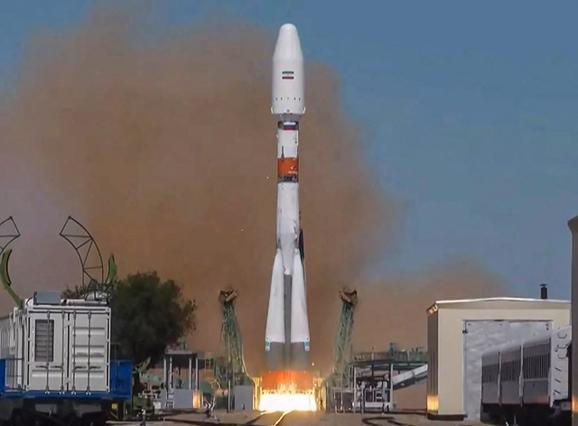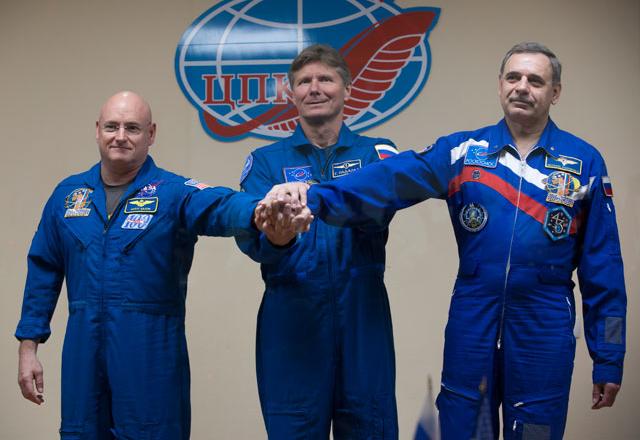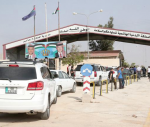You are here
Russia targets space station project in retaliation for US sanctions
By Reuters - May 13,2014 - Last updated at May 13,2014
MOSCOW/KIEV — Russia cast doubt on the long-term future of the International Space Station, a showcase of post-Cold War cooperation, as it retaliated on Tuesday against US sanctions over Ukraine.
Deputy Prime Minister Dmitry Rogozin said Moscow would reject a US request to prolong the orbiting station’s use beyond 2020 and bar Washington from using Russian-made rocket engines to launch military satellites.
Moscow took the action, which also included suspending operation of GPS satellite navigation system sites on its territory from June, in response to US plans to deny export licences for high-technology items that could help the Russian military.
“We are very concerned about continuing to develop high-tech projects with such an unreliable partner as the United States, which politicises everything,” Rogozin told a news conference.
Washington wants to keep the $100 billion, 15 nation space station project in use until at least 2024, four years beyond the previous target.
While six years away, the plan to part ways on a project which was supposed to end the “space race” underlines how relations between the former Cold War rivals have deteriorated since Russia annexed Ukraine in March.
Since the end of the US Space Shuttle project, Russian Soyuz spacecraft have been the only way astronauts can get to the space station, whose crews include both Americans and Russians.
At a time when Moscow is struggling to reform its accident-plagued space programme, Rogozin said US plans to deny export licences for some high-technology items were a blow to Russian industry. “These sanctions are out of place and inappropriate,” Rogozin said. “We have enough of our own problems.”
Moscow’s response would affect NK-33 and RD-180 engines which Russia supplies to the United States, Rogozin said. “We are ready to deliver these engines but on one condition that they will not be used to launch military satellites,” he said.
RD-180 engines are used to boost Atlas 5 rockets manufactured by United Launch Alliance, a partnership of Lockheed Martin and Boeing that holds a virtual monopoly on launching US military satellites.
Rogozin said Moscow was planning “strategic changes” in its space industry after 2020, and aims to use money and “intellectual resources” that now go to the space station for a “a project with more prospects”.
He suggested Russia could use the station without the United States, saying: “The Russian segment can exist independently from the American one. The US one cannot.”
The US space agency NASA is working with companies to develop space taxis with the goal of restoring US transport to the station by 2017, but the United States currently pays Russia more than $60 million per person to fly its astronauts up.
Rogozin said Russia will suspend the operation of 11 GPS sites on its territory from June and seek talks with Washington on opening similar sites in the United States for Russia’s own satellite navigation system, Glonass.
He threatened the permanent closure of the GPS sites in Russia if that is not agreed by September.
Rogozin said the suspension of the sites would not affect everyday operations of the GPS system in Russia, where it is used by millions of Russians for navigation on their smartphones and in their cars.
The upheaval in Ukraine — where the United States says Russia is backing separatists and the Kremlin accuses Washington of helping protesters to topple a Moscow-friendly president in February, has led to the worst East-West crisis since the 1991 collapse of the Soviet Union.
In addition to the high-tech sector sanctions, the United States has imposed visa bans and assets freezes on officials and lawmakers, and targeted companies with links to President Vladimir Putin. The European Union has also imposed sanctions.
The Russian Foreign Ministry said earlier on Tuesday that the latest EU measures were an “exhausted, trite approach” that would only deepen discord and hamper efforts to defuse the crisis in Ukraine.
Separatist ambush
Six Ukrainian soldiers were killed and eight wounded on Tuesday when their armoured column was ambushed by pro-Russian separatists near the eastern Ukrainian town of Kramatorsk, the Defence Ministry said.
It was the biggest single loss of life by the Ukrainian army since soldiers were sent into the mainly Russian-speaking east of the country to break up armed separatist groups who have seized control of towns and public buildings in a bid to further demands for autonomy.
The ministry, in a statement published on its website, said an armoured column came under fire as it approached a bridge near a village 20km from Kramatorsk, one of several hot spots in the region where the army has had only limited success against the separatists.
About 30 rebels, who had taken cover among bushes along a river, attacked with grenade-launchers and automatic weapons, immediately killing two soldiers and wounding three others, it said.
“In all, as a result of the prolonged fighting, 6 members of the armed forces were killed. Eight soldiers were wounded, one of them seriously,” it said.
Earlier on Tuesday Defence Minister Mikhailo Koval said a total of 9 servicemen had been killed so far in the “anti-terrorist” operation which has been directed mainly against rebels in the towns of Slaviansk and Mariupol.
The dead included 5 pilots, Koval said, who apparently died when their helicopters were downed by separatist fire.
Related Articles
Authorities on Wednesday started investigating what made an unmanned US supply rocket explode in a fireball moments after lifting off from a launch pad in Virginia, destroying supplies and equipment bound for the International Space Station.
ALMATY, Kazakhstan — An Iranian satellite launched by Russia blasted off from Kazakhstan on Tuesday and reached orbit amid controversy that
Hundreds of kilometres below on Earth, their governments are locked in a standoff over Ukraine — but up in space, Russian cosmonauts and American astronauts are still working together side by side.


















